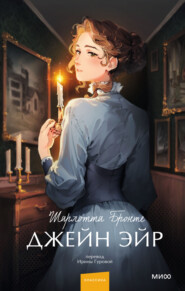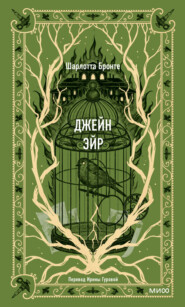По всем вопросам обращайтесь на: info@litportal.ru
(©) 2003-2024.
✖
Shirley
Настройки чтения
Размер шрифта
Высота строк
Поля
Thus, in the utter sickness of longing and disappointment, she went home.
The next morning at breakfast, where she appeared white-cheeked and miserable-looking as one who had seen a ghost, she inquired of Mr. Helstone, “Have you any objection, uncle, to my inquiring for a situation in a family?”
Her uncle, ignorant as the table supporting his coffee cup of all his niece had undergone and was undergoing, scarcely believed his ears.
“What whim now?” he asked. “Are you bewitched? What can you mean?”
“I am not well, and need a change,” she said.
He examined her. He discovered she had experienced a change, at any rate. Without his being aware of it, the rose had dwindled and faded to a mere snowdrop; bloom had vanished, flesh wasted; she sat before him drooping, colourless, and thin. But for the soft expression of her brown eyes, the delicate lines of her features, and the flowing abundance of her hair, she would no longer have possessed a claim to the epithet pretty.
“What on earth is the matter with you?” he asked. “What is wrong? How are you ailing?”
No answer; only the brown eyes filled, the faintly-tinted lips trembled.
“Look out for a situation, indeed! For what situation are you fit? What have you been doing with yourself? You are not well.”
“I should be well if I went from home.”
“These women are incomprehensible. They have the strangest knack of startling you with unpleasant surprises. Today you see them bouncing, buxom, red as cherries, and round as apples; tomorrow they exhibit themselves effete as dead weeds, blanched and broken down. And the reason of it all? That’s the puzzle. She has her meals, her liberty, a good house to live in, and good clothes to wear, as usual. A while since that sufficed to keep her handsome and cheery, and there she sits now a poor, little, pale, puling chit enough. Provoking! Then comes the question: What is to be done? I suppose I must send for advice. Will you have a doctor, child?”
“No, uncle, I don’t want one. A doctor could do me no good. I merely want change of air and scene.”
“Well, if that be the caprice, it shall be gratified. You shall go to a watering place. I don’t mind the expense. Fanny shall accompany you.”
“But, uncle, someday I must do something for myself; I have no fortune. I had better begin now.”
“While I live, you shall not turn out as a governess, Caroline. I will not have it said that my niece is a governess.”
“But the later in life one makes a change of that sort, uncle, the more difficult and painful it is. I should wish to get accustomed to the yoke before any habits of ease and independence are formed.”
“I beg you will not harass me, Caroline. I mean to provide for you. I have always meant to provide for you. I will purchase an annuity. Bless me! I am but fifty-five; my health and constitution are excellent. There is plenty of time to save and take measures. Don’t make yourself anxious respecting the future. Is that what frets you?”
“No, uncle; but I long for a change.”
He laughed. “There speaks the woman!” cried he, “the very woman! A change! a change! Always fantastical and whimsical! Well, it’s in her sex.”
“But it is not fantasy and whim, uncle.”
“What is it then?”
“Necessity, I think. I feel weaker than formerly. I believe I should have more to do.”
“Admirable! She feels weak, and therefore she should be set to hard labour—‘clair comme le jour,’ as Moore – confound Moore! You shall go to Cliff Bridge; and there are two guineas to buy a new frock. Come, Cary, never fear. We’ll find balm in Gilead.”
“Uncle, I wish you were less generous and more.”
“More what?”
Sympathizing was the word on Caroline’s lips, but it was not uttered. She checked herself in time. Her uncle would indeed have laughed if that namby-pamby word had escaped her. Finding her silent, he said, “The fact is, you don’t know precisely what you want.”
“Only to be a governess.”
“Pooh! mere nonsense! I’ll not hear of governessing. Don’t mention it again. It is rather too feminine a fancy. I have finished breakfast. Ring the bell. Put all crotchets out of your head, and run away and amuse yourself.”
“What with? My doll?” asked Caroline to herself as she quitted the room.
A week or two passed; her bodily and mental health neither grew worse nor better. She was now precisely in that state when, if her constitution had contained the seeds of consumption, decline, or slow fever, those diseases would have been rapidly developed, and would soon have carried her quietly from the world. People never die of love or grief alone, though some die of inherent maladies which the tortures of those passions prematurely force into destructive action. The sound by nature undergo these tortures, and are racked, shaken, shattered; their beauty and bloom perish, but life remains untouched. They are brought to a certain point of dilapidation; they are reduced to pallor, debility, and emaciation. People think, as they see them gliding languidly about, that they will soon withdraw to sickbeds, perish there, and cease from among the healthy and happy. This does not happen. They live on; and though they cannot regain youth and gaiety, they may regain strength and serenity. The blossom which the March wind nips, but fails to sweep away, may survive to hang a withered apple on the tree late into autumn: having braved the last frosts of spring, it may also brave the first of winter.
Every one noticed the change in Miss Helstone’s appearance, and most people said she was going to die. She never thought so herself. She felt in no dying case; she had neither pain nor sickness. Her appetite was diminished; she knew the reason. It was because she wept so much at night. Her strength was lessened; she could account for it. Sleep was coy and hard to be won; dreams were distressing and baleful. In the far future she still seemed to anticipate a time when this passage of misery should be got over, and when she should once more be calm, though perhaps never again happy.
Meanwhile her uncle urged her to visit, to comply with the frequent invitations of their acquaintance. This she evaded doing. She could not be cheerful in company; she felt she was observed there with more curiosity than sympathy. Old ladies were always offering her their advice, recommending this or that nostrum; young ladies looked at her in a way she understood, and from which she shrank. Their eyes said they knew she had been “disappointed,” as custom phrases it; by whom, they were not certain.
Commonplace young ladies can be quite as hard as commonplace young gentlemen – quite as worldly and selfish. Those who suffer should always avoid them. Grief and calamity they despise; they seem to regard them as the judgments of God on the lowly. With them, to “love” is merely to contrive a scheme for achieving a good match; to be “disappointed” is to have their scheme seen through and frustrated. They think the feelings and projects of others on the subject of love similar to their own, and judge them accordingly.
All this Caroline knew, partly by instinct, partly by observation. She regulated her conduct by her knowledge, keeping her pale face and wasted figure as much out of sight as she could. Living thus in complete seclusion, she ceased to receive intelligence of the little transactions of the neighbourhood.
One morning her uncle came into the parlour, where she sat endeavouring to find some pleasure in painting a little group of wild flowers, gathered under a hedge at the top of the Hollow fields, and said to her in his abrupt manner, “Come, child, you are always stooping over palette, or book, or sampler; leave that tinting work. By-the-bye, do you put your pencil to your lips when you paint?”
“Sometimes, uncle, when I forget.”
“Then it is that which is poisoning you. The paints are deleterious, child. There is white lead and red lead, and verdigris, and gamboge, and twenty other poisons in those colour cakes. Lock them up! lock them up! Get your bonnet on. I want you to make a call with me.”
“With you, uncle?”
This question was asked in a tone of surprise. She was not accustomed to make calls with her uncle. She never rode or walked out with him on any occasion.
“Quick! quick! I am always busy, you know. I have no time to lose.”
She hurriedly gathered up her materials, asking, meantime, where they were going.
“To Fieldhead.”
“Fieldhead! What! to see old James Booth, the gardener? Is he ill?”
“We are going to see Miss Shirley Keeldar.”
“Miss Keeldar! Is she coming to Yorkshire? Is she at Fieldhead?”
“She is. She has been there a week. I met her at a party last night – that party to which you would not go. I was pleased with her. I choose that you shall make her acquaintance. It will do you good.”
“She is now come of age, I suppose?”
“She is come of age, and will reside for a time on her property. I lectured her on the subject; I showed her her duty. She is not intractable. She is rather a fine girl; she will teach you what it is to have a sprightly spirit. Nothing lackadaisical about her.”
“I don’t think she will want to see me, or to have me introduced to her. What good can I do her? How can I amuse her?”
“Pshaw! Put your bonnet on.”

















